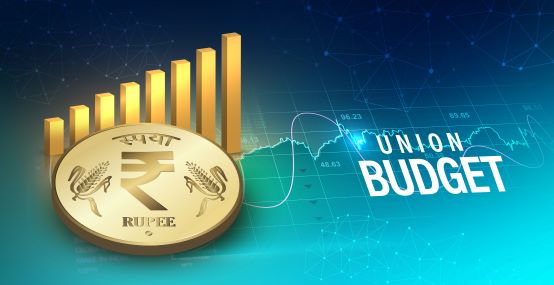Analysis of Interim Budget 2024

On 1st February 2024, Union Finance Minister Nirmala Sitharaman presented her 6th budget. This being an election year, it was an interim budget. Our broad-level view is that this Union Budget has maintained the Capex-led template to deliver socio-economic growth while maintaining fiscal prudence. While there were several other announcements, the ICICI Direct's Research team has reviewed a few key aspects of the budget in an attempt to dig a little deeper into the budget beyond the basic facts.
Fiscal Deficit
On the fiscal deficit front, the continuation of the fiscal glide path over the next two years is positive. The revised budget estimate for FY24 has dropped to 5.8%, while the budgeted estimate for FY25 has also seen a downward revision to 5.1%. The fiscal deficit and the borrowing estimate were also lower than market expectations at ₹ 14.1 lakh crore vs market expectations, which was around the ₹ 15 lakh crore mark. The Government&rsquo's target to reduce the deficit to 4.5% by FY26 is also on track.
Capex Spending
With a Capex allocation growth of 11.2% YoY for FY25 – taking the infra outlay to ₹ 11.11 lakh crore – this interim budget has built on the capex-led growth template. This capex intensity has been maintained even though capex spending has grown at a CAGR of 20% over FY21-FY25. And the capex to GDP is now pegged at an all-time high of 3.4% in FY25. Key segments like Rails, Roads, and Defence have seen their allocation rise by 3-9% over the already high base, given that FY22-FY24 witnessed double-digit growth in outlay.
Lower Borrowing
The fiscal prudence displayed by the Government, along with the impending Global bond index inclusion, places the Indian debt market in a sweet spot from a demand and supply dynamics perspective. Furthermore, a combination of lower-than-anticipated fiscal deficit and borrowing further boosts the debt market, making it an attractive proposition for banks – particularly PSUs.
Gross Tax Revenue Growth
The FY25 projected gross tax revenue growth stands at 11.5%, with a direct tax growth expectation of 13.0%. This robust growth in direct taxes indicates continued trust in the economy and potentially more disposable income in the hands of individuals. While the Goods and Services Tax (GST) remains a strong contributor, with an expected growth of 11.6% in FY25, its pace is slightly slower compared to the FY24's 12.7%. This could be attributed to factors like maturing of the base and evolving consumption patterns. Interestingly, the excise duty revenue growth is estimated to be a more moderate 5%, reflecting a shift towards a service-driven economy and potentially targeted adjustments in excise rates.
Disinvestment
The Budget 2024 presents a revised disinvestment target for the current fiscal year (FY24RE) of ₹ 30,000 crore, a significant downward adjustment from the previously budgeted ₹ 51,000 crore. This revision suggests a cautious approach amidst market uncertainties and a strategic focus on quality asset sales. While the FY25E target remains steady at ₹ 50,000 crores, it indicates a continued commitment to strategic disinvestment as a means to mobilize resources for government initiatives.
Direct Benefit Transfers
The Budget underscores the government's continued emphasis on "GYAM" – Gareeb (poor), Yuva (youth), Annadata (farmers), and Mahila (women) – by effectively utilizing direct benefit transfers (DBT) to deliver various social welfare schemes. This targeted approach aims to ensure financial assistance reaches intended beneficiaries directly, minimising leakages and maximising impact.
This being an interim budget, the government could not announce any major policy changes or any major scheme like it can during a full budget. The next full budget will only be presented by the next government after the elections are done – and that’s when we can expect major shakeups.
Disclaimer – ICICI Securities Ltd. ( I-Sec). Registered office of I-Sec is at ICICI Securities Ltd. - ICICI Venture House, Appasaheb Marathe Marg, Prabhadevi, Mumbai - 400 025, India, Tel No : 022 - 6807 7100. The contents herein above shall not be considered as an invitation or persuasion to trade or invest. I-Sec and affiliates accept no liabilities for any loss or damage of any kind arising out of any actions taken in reliance thereon. The contents herein above are solely for informational purpose and may not be used or considered as an offer document or solicitation of offer to buy or sell or subscribe for securities or other financial instruments or any other product. Investments in securities market are subject to market risks, read all the related documents carefully before investing. The contents herein mentioned are solely for informational and educational purpose.
Please Enter Email
Thank you.
Related content

Articles - Personal Finance
What is PM Gati Shakti Yojana
Hon'ble Finance Minister Nirmala Sitharaman unveiled three major economic railway corridors in the interim budget of 2024 for the PM Gati Shakti Yojana. Explore detailed information about PM Gati Shakti Yojana.

Articles - Personal Finance
What Is a Surplus Budget
Learn about surplus budget and how a budget surplus impacts the economony.

Articles - Personal Finance
Union Budget 2024 – Trivia Part 2
The Union budget 2024 presentation is just around the corner. Let us look at some trivia regarding the Union budgets from the past

Articles - Personal Finance
What is Union Budget and Why it so Important
Learn about the what is the Union Budget in this article for a comprehensive information of its importance.

Articles - Personal Finance
Union Budget: Key Details & Importance
As we come closer to February 1, the chatter around the expectations over Union Budget increases. From young college students looking to start their careers and small business owners to leading economists and industrialists, almost every Indian citizen keeps a tab on the Budget announcement. Let us discuss what is Union Budget and its importance for the economy.

Articles - Personal Finance
Impact of the Budget 2024 on Share Markets
The Union Budget 2024 got quite a cheer from the share market as major indices ended on a positive note. The NIFTY 50 and the Sensex benchmark indices gained during the Budget speech and finished green.

Articles - Personal Finance
What to Expect From Budget 2022 for Individuals and Salaried People
Over the last two years, individuals, especially salaried people, have taken quite a hit because of the pandemic. Work from home has not only increased expenses such as electricity and WiFi bills but has also put a strain on take-home salary. Naturally, people hope that the government will step in and ease some of these troubles through their Union Budget announcements.

Articles - Personal Finance
What is the impact of the Union Budget on the Indian Stock Markets
Indian stock markets are dynamic prone to ups and downs depending on a host of factors. Every year, one major event that impacts the equities and bond markets is the announcement of the Union Budget.

Articles - Personal Finance
History of the Union Budget in India
The ritual of presenting the Indian Budget is more than two centuries old, dating back to colonial times. India's first-ever Budget was presented by James Wilson in 1860, a Scottish economist and politician.

Articles - Personal Finance
10 Taxes Affected by Budget
Taxes are the most crucial and most significant source of revenue for the Government. The Government uses the revenues generated from taxes to provide basic facilities to its citizens and the nation's overall development. For example, construction of roads, buildings, infrastructure, public healthcare facilities, providing various subsidies, etc.

Articles - Personal Finance
What is Populist Budget
A budget typically meant to please people is known as a populist budget. It spends more on lucrative schemes that can increase the Government's fiscal deficit. Such a budget doesn't have any enduring positive impact on the country's economy.

Articles - Personal Finance
What are the Components of Union Budget
The Union Budget of India has two main components, each with two sub-components. To know more in detail, visit the link.

Articles - Personal Finance
Types of Budget in India
Deep dive into the three different types of government budgets and their impact on the economy.

Articles - Stocks
What is the Budget? Union Budget for Beginners
The Finance Minister of India presents the Union Budget on the first day of February every year. It is also known as the annual financial statement of the country. It contains the details of the revenue sources and expenses undertaken by the Government during the applicable financial year.

 Top Mutual Funds
Top Mutual Funds







COMMENT (0)